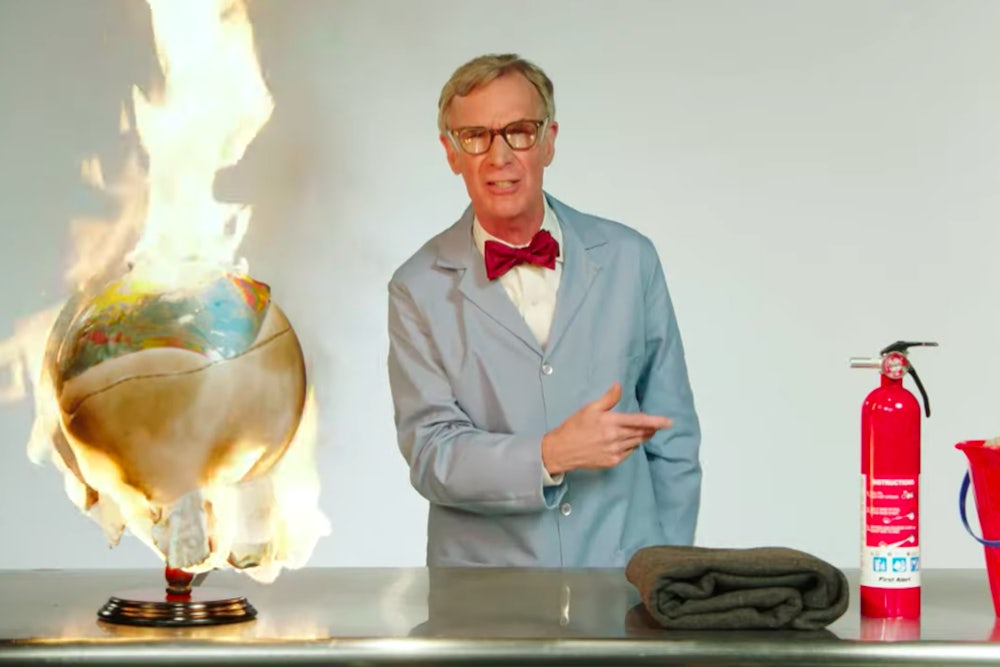Bill Nye has reached the end of his rope. He’s been trying to explain complex scientific concepts to a general audience in a joyous, digestible way for more than a quarter century. But there’s one critical concept they just don’t seem to be getting, no matter how much he explains it. And Nye has run out of joy.
“The planet’s on fucking fire,” the Science Guy exclaimed on a recent episode of HBO’s Last Week Tonight with John Oliver. Moments before, Nye had taken a blowtorch to a plastic globe next to him (wearing safety glasses, of course). “There are a lot of things we could do to put [the fire] out,” he said, the flames casting a soft glow on his face. “Are any of them free? No! Of course not! Nothing’s free, you idiots. Grow the fuck up. You’re not children anymore. I didn’t mind explaining photosynthesis to you when you were twelve. But you’re adults now, and this is an actual crisis. Got it?”
“Safety glasses off, motherfuckers.”
Nye’s outburst was catnip for news outlets. The Washington Post, The Guardian, HuffPost, and CBS News picked up the segment, and MSNBC was still using it as discussion fodder a week after it aired. In this regard, his performance was praiseworthy. He drew renewed attention to the urgency of climate crisis, and ignited a conversation about how we can possibly fix it.
But there was a problem with Nye’s segment: his explanation of the crisis itself. The planet is not “on fucking fire,” and saying so obscures both the reality and the totality of the problem.
It’s hard to overstate the importance of language in the climate fight, because the absence of effective communication is what’s stalled action for so long. David Wallace-Wells, the author of the terrifying but science-based climate book The Uninhabitable Earth, said as much in an appearance on MSNBC on Sunday (an appearance that, as it happened, was in response to Bill Nye’s segment). In response to a question about how to get people to take action on climate change, Wallace-Wells replied, “It’s about being honest about the science, frankly. For a long time, we didn’t see in the public what was happening.”
We didn’t see what was happening partially because journalists weren’t covering it, but also because those who were covering it weren’t using the proper language, for fear of being seen as alarmist. That’s why publications like The Guardian are just now realizing that they need to change how they write about it. Last week, the paper announced its writers will no longer be using the term “climate change” to describe the problem; they’ll use “climate emergency,” “climate crisis,” or “climate breakdown” instead. Those phrases convey what’s really happening.
And what’s going on with the planet if it’s not on “fucking fire”? Well, technically, some of it is on fire, namely in California. But other parts are drowning in biblical floodwaters, or turning to dust from biblical drought, or being slowly swallowed by the ocean. We’re losing our ability to grow fucking food. All the coral in the ocean is literally dying. We’re killing all the fucking animals. The ground is randomly exploding and opening up giant mystery sinkholes that probably contain ancient fucking diseases? We’re causing air pollution that will kill as many people as 25 Holocausts.
It’s not that Nye intentionally confused or harmed anyone by exaggerating about climate change; hyperbole was clearly the whole point of lighting a globe on fire. But the actual impacts of climate change are just as terrifying as the planet being physically on fire, if not worse. Nye thus missed an opportunity to be just as powerful, while also educating people on the true catastrophe that climate change is sowing. He was less the Science Guy than a pundit in a lab coat.
People, in general, are bad at thinking about these consequences. They think about climate change as being about the survival of “the planet,” and not themselves. But the planet will survive global warming. It’s our lives that are on the line. And with only 11 years left to prevent the worst of it, every word counts.
